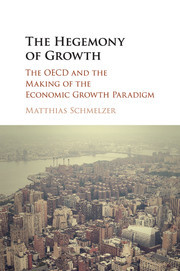Description
The Hegemony of Growth
The OECD and the Making of the Economic Growth Paradigm
Author: Schmelzer Matthias
The first comprehensive historical overview of the OECD's role in the concept of economic growth becoming an international norm.
Language: English
Subject for The Hegemony of Growth:
Approximative price 38.06 €
In Print (Delivery period: 14 days).
Add to cart
The Hegemony of Growth
Publication date: 10-2017
Support: Print on demand
Publication date: 10-2017
Support: Print on demand
Approximative price 104.06 €
In Print (Delivery period: 14 days).
Add to cart
The Hegemony of Growth
Publication date: 05-2016
Support: Print on demand
Publication date: 05-2016
Support: Print on demand
Description
/li>Contents
/li>Biography
/li>
In modern society, economic growth is considered to be the primary goal pursued through policymaking. But when and how did this perception become widely adopted among social scientists, politicians and the general public? Focusing on the OECD, one of the least understood international organisations, Schmelzer offers the first transnational study to chart the history of growth discourses. He reveals how the pursuit of GDP growth emerged as a societal goal and the ways in which the methods employed to measure, model and prescribe growth resulted in statistical standards, international policy frameworks and widely accepted norms. Setting his analysis within the context of capitalist development, post-war reconstruction, the Cold War, decolonization, and industrial crisis, The Hegemony of Growth sheds new light on the continuous reshaping of the growth paradigm up to the neoliberal age and adds historical depth to current debates on climate change, inequality and the limits to growth.
Introduction; Setting the stage: a historical introduction to the OECD; Part I. Paradigm in the Making: The Emergence of Economic Growth as the Key Economic Policy Norm (1948–59): 1. Measuring growth: the international standardization of national income accounting; 2. Propagating growth: from reconstruction and stability to 'selective expansion' and 'productivity'; 3. 'Expand or die': international economic mandarins and the transnational harmonization of growth policies; Part II. Paradigm at Work: A 'Temple of Growth for Industrialized Countries' in Action (1960–8): 4. Power, progress, and prosperity: growth as universal yardstick and the OECD's 1961 growth target in perspective; 5. Boosting growth: the Western 'growth conscience' and policies in the name of accelerated growth; 6. Replicating growth: the 'development of others' and the hegemony of donor countries; Part III. Paradigm in Discussion: The 'Problems of Modern Society', Environment, and Welfare (1969–74): 7. Quantity in question: challenging the hegemony of growth and the OECD-Club of Rome nexus; 8. Reclaiming growth: organizational dynamics and the 'dialectic' of qualitative growth; 9. Quantifying quality: managing the environmental costs of growth and the difficult quest for 'gross national well-being'; Epilogue: paradigm remade (1975–2011); Conclusion: provincializing growth.
Matthias Schmelzer is a postdoctoral researcher at the University of Zürich, Switzerland. His areas of interests include transnational social and economic history, social movements, and the history of capitalism.
© 2024 LAVOISIER S.A.S.




